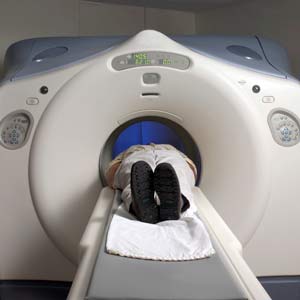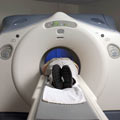Description of the test
Magnetic resonance imaging (MRI) provides a detailed look at organs and structures in the body. This test uses a magnetic field and energy pulses to create images.
The machine used for an MRI is very large. In most cases, the test is performed by a qualified MRI technologist in a hospital or in a clinic that has an MRI machine.
How often should the test be performed?
This test is done as needed when a doctor requires a detailed cross-sectional image of inside the body.
Why is this test performed?
Because an MRI scan creates detailed images of the body, doctors use this test as a tool to identify problems in people with various symptoms or conditions.
An MRI can be used to detect tissue damage, tumours, infections, or blood flow problems. Also, it shows blood clots, brain damage, and nerve damage (as occurs in multiple sclerosis). The test can also detect damage to the heart and lungs, reproductive system, bladder, bones and joints (such as arthritis), and spine.
Sometimes the technologist will inject a special dye (also called contrast material, contrast dye, or contrast medium) into your arm. This makes images of any damaged or abnormal tissue (especially blood vessels) clearer.
Are there any risks and precautions?
The powerful magnetic field used during an MRI does not hurt or cause damage to your body. The magnetic field and the pulses of energy do not cause cancer. However, the magnet can damage certain pacemakers, artificial limbs, and other metallic medical devices. Unsecured metal objects (such as watches, jewellery, hairpins, or dentures) must be removed prior to the scan or they will be rapidly pulled toward the magnet, potentially causing serious injury.
There is a slight risk of allergic reactions to the dyes used to provide clearer MRI pictures. It's important to tell your doctor and the radiologist if you have allergies of any kind, particularly to contrast dyes.
The contrast dye that is commonly used in MRI is called gadolinium. It's important to notify your doctor and radiologist if you have any serious kidney disease, as this dye may cause a rare but serious skin disease in these people.
If you have any metal objects in your eye, tell your doctor or the person performing the test. The magnetic field may cause metal pieces to move which may damage the eye. Because the effects of MRI tests on unborn babies are not known, inform your doctor or the person performing the test if you are or may be pregnant.
If you are taking any medications in the form of a patch, make sure to tell your doctor about this before starting the MRI test. Patches with an aluminum or foil backing can react with the MRI test, leading to skin burns. These types of patches should be removed before the MRI test.
What happens during the test?
You will be asked to lie face-up on a table that is part of the MRI scanner. For most MRI machines, the table slides into a narrow tunnel that contains the magnet, and the part of the body that is being examined is moved into the center of the magnet. Some MRI machines are suspended over a table and are open on the sides. An MRI test usually lasts between 30 and 60 minutes.
The machine makes loud noises for minutes at a time during the test. This may be disturbing for some people. If you are bothered by loud noises, try wearing earplugs for the test. It is extremely important to remain still to achieve the most accurate images possible.
Before the test starts, you should be given a button to press that alerts the technologist if you become too uncomfortable at any point during the test. If you are very nervous or feel claustrophobic in small spaces, your doctor may prescribe a sedative for you to take before the test. If you take a sedative, you will need to have someone drive you to and from your appointment.
How should I prepare for this test?
If your doctor tells you that you need to have an MRI, there are certain things you'll be asked about before having the test.
Tell your doctor if you:
- are uncomfortable in small spaces
- have a pacemaker, artificial heart valve, artificial limb, cochlear implant, dental implants, metal implants or pins, or any other implanted or prosthetic medical device
- have worked in areas with metal, such as in factories
- are pregnant or think you might be pregnant
- have an allergy of any kind (the dyes used during MRIs could cause serious allergic reactions in some people with preexisting allergies, including those involving hay fever, hives, or asthma, as well as food or medication allergies)
- have an intrauterine device (IUD)
- have a medication patch on your skin (the patch may burn during the test if not removed)
- have any medical conditions (people with certain conditions should not use the MRI test dyes)
- have tattoos or tattooed eyeliner
You will need to remove all metal objects including hearing aids, dentures, jewellery, and hairpins. Otherwise, these objects will be attracted to the powerful magnet used during the MRI. You should also remove ATM and credit cards because the MRI may erase the information contained in the scanner strips of these cards.
You may be asked not to eat or drink anything 4 to 6 hours before the scan.
Tell your doctor or prescriber about all prescription, over-the-counter (non-prescription), and herbal medications that you are taking. Also tell them about any medication allergies and medical conditions that you may have.
Ask your doctor or pharmacist whether you need to stop taking any of your medications before the test.
What can I expect after the test?
The radiologist might discuss preliminary results of the test after its completion. No pain or other sensations normally occur after an MRI. You can return to your usual activities once the test is complete.
Results
A radiologist reviews and interprets the images from an MRI scan. Full results are usually available a couple of days later, and your doctor will discuss these results with you.
All material copyright MediResource Inc. 1996 – 2024. Terms and conditions of use. The contents herein are for informational purposes only. Always seek the advice of your physician or other qualified health provider with any questions you may have regarding a medical condition. Source: www.medbroadcast.com/procedure/getprocedure/Magnetic-Resonance-Imaging


